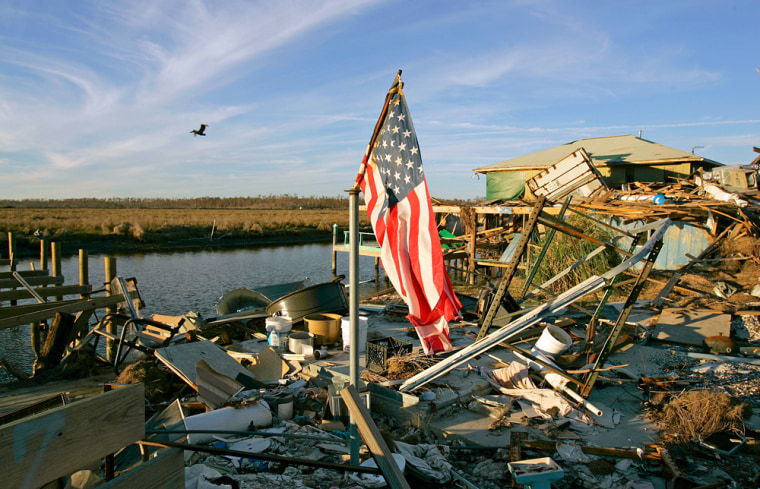Federal programs and funds to help the Gulf Coast recover from Hurricane Katrina do not go far enough to help, according to lawmakers touring the battered region Tuesday.
“The tools we have in our toolbox are not effective,” said Sen. Mary Landrieu, D-La., on a flight to Gulfport, Miss., where blue-tarped roof dotted the city’s houses. She was with a delegation of senators who also planned to tour disaster sites in the New Orleans area. “We need a new tool.”
Though the federal government has set aside nearly $70 billion for emergency relief and long-term recovery plans, Landrieu said massive reforms at the Federal Emergency Management Agency, which distributes disaster relief, and the Army Corps of Engineers, which oversees the New Orleans levees that were breached by the storm’s surge, also are necessary. And she called on Congress to approve a federally aided regional redevelopment program like the one proposed by Rep. Richard Baker, R-La.
At a Senate Homeland Security and Government Affairs hearing here, Donald Powell, the federal official coordinating government plans to rebuild the Gulf Coast, said he has limited authority to spur the region’s long-term recovery. He said he relies on “the power of persuasion” to enact progress.
“Would it be easier to do your job if you had more specific authority over the allocation of resources and personnel?” asked Sen. Susan Collins, R-Maine, who chaired the hearing.
“At times, yes, quite frankly,” Powell responded. But, he added, “To date the cooperation is extraordinary.”
Several senators said they were troubled by Powell’s limitations. Powell, the former Federal Deposit Insurance Corp. chairman who was tapped in November for the recovery post, is tasked with for dealing with plans by Congress, state and local governments, and private businesses to rebuild the region.
Senators access damage
More than a half-dozen senators visited the region to examine what more Congress needs to do, four months after the Aug. 29 storm.
“The devastation is so widespread that a sustained federal commitment is going to be necessary,” Collins said in an earlier interview. “I think Congress realizes that, but there’s also a growing concern about whether the money is well spent.”
So far, Congress has approved $67 billion for the Gulf Coast, and President Bush has called for an additional $1.5 billion to strengthen New Orleans levees. But Collins said hard-hit areas — including Gulfport, Miss., and St. Bernard Parish in Louisiana — need more federal resources and attention.
Senators will visit both of those places — nearly obliterated by Hurricane Katrina’s high winds and flood waters on Aug. 29 — and tour parts of New Orleans while inspecting progress on rebuilding its levees. They also plan to conduct a hearing on recovery efforts.
Other calls for more help
Democrats, too, are watching how Congress will pay for what they called continued necessary assistance to the Gulf Coast amid a rising deficit and other high-cost expenses, including the war in Iraq.
“This is really a catastrophe of enormous proportions, and I don’t think we appropriated nearly enough to help,” Rep. Barbara Lee, D-Calif., said last week after reviewing damage in the New Orleans area. She is calling for Congress to repeal Bush’s tax cuts to help pay for rebuilding costs.
Last month, Mississippi Gov. Haley Barbour, the former chairman of the Republican National Committee, chastised Congress for failing to approve emergency funding, which he said has stalled transportation, school and housing projects.
In prepared testimony for a Senate hearing in Gulfport on Tuesday, the Bush administration’s rebuilding czar outlined two top priorities for Mississippi: debris removal and temporary housing for evacuees.
Mississippi has cleaned up 27 million cubic yards of debris — about two-thirds of the total, said Donald Powell, the federal Gulf Coast coordinator. He estimated that Hancock, Harrison and Jackson counties in Mississippi were left with more debris after Katrina than totals after Hurricane Andrew in 1992 and the World Trade Center from the 2001 terror attacks combined.
Powell also estimated that fewer than 2,000 evacuated families remain in Mississippi hotels, and that 280,000 state residents have received transitional housing assistance.
“Every time some type of natural disaster has hit, the people of this region have come back, and come back stronger than before,” Powell said in his prepared remarks, obtained by The Associated Press. “Failure is not an option. ... It’s too important a task not to do it right.”
